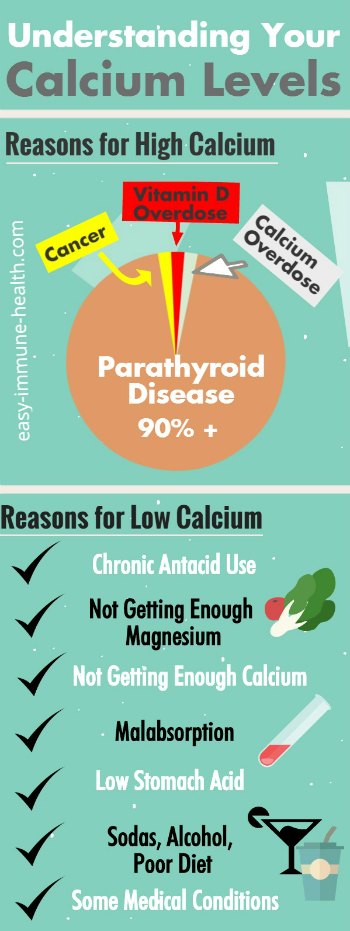Blood Calcium Levels
Have Little to do With
Your Calcium Intake
The Facts About Blood Calcium Levels are likely NOT common knowledge, nor even common MEDICAL knowledge, and it's not likely that your doctor is going to tell you this information about your calcium blood levels.
Interesting Facts About
Blood Calcium Levels
Unlike some blood tests that are quite straightforward, calcium blood levels are complicated. When people see their blood calcium level on their laboratory test, they are likely to think that a normal calcium level means that they are getting adequate calcium- either by diet or supplements.
Conversely, they also may believe that a HIGH blood calcium level means that they are getting too much and that a low level means that they are getting too little calcium.
But this is just simply not true at all. Very similar to Potassium Level, your BLOOD CALCIUM LEVELS HAVE ALMOST NOTHING TO DO WITH YOUR CALCIUM INTAKE!!
This is an extremely important concept to understand because it is VERY different from other nutritional blood levels such as:
all of the above blood levels, while not NECESSARILY useful for determining your need to supplement, DO reflect dietary intake of the substance in a fairly linear fashion. If you take more vitamin d, magnesium or Vitamin B12- your level goes up. You stop getting these, your levels will go down eventually. But when Understanding Blood Test Results, it's important to know that this is NOT the way that it works with calcium.
Why They are Important
Calcium is an important mineral for functions such as nerve conduction and muscular contraction- including the nerves and muscles of the heart, brain and spinal cord. Because of this, the body is VIGILANT about maintaining calcium levels in the blood at a normal level. And your body will do just about anything to maintain this level in the proper range. So, if you don't get enough calcium, your body will pull calcium from the bones in order to keep your blood calcium levels normal, but leading to osteoporosis or osteomalacia.
If you take too much calcium, you will almost never have a Calcium Overdose, instead the body will get rid of it in your urine (which can lead to kidney stones) or in your organs (which can lead to calcification). Your body doesn't care if you get kidney stones or osteoporosis in the long term- it is a higher priority for it to maintain a proper blood calcium level for nerve conduction and heart function.
Therefore, your calcium blood level is virtually WORTHLESS in determining whether you get enough calcium in your diet and whether or not you should supplement with calcium.
What Your Levels Mean
Normal Calcium blood levels mean that your body is doing a great job of maintaining the calcium level in your blood. That's it. You can really only infer from this that you do NOT have a pathological condition of calcium abnormality - such as a parathyroid tumor.
But what you CANNOT assume is that you are:
- Getting the 'Right' amount of calcium in your diet
- That your calcium supplements are getting absorbed
- That your bones are strong and healthy
- That the calcium you are absorbing is going to your bones
What Do High Levels Mean
If you have a Elevated Calcium or 'borderline' high blood calcium level, this is a problem and your doctor needs to find out why your level is high. In the vast majority of cases you do NOT get a high calcium blood level from taking too many calcium supplements. While you should stop taking Vitamin D and/or calcium supplements unless your doctor specifically states that you should, high calcium levels are almost ALWAYS due to a medical problem that needs to be addressed and not due to a Calcium Overdose.
Conversely, when you stop taking calcium supplements, your calcium level is not likely to go down. The reason that you should not take calcium if your level is high is to decrease the chance of depositing calcium into your organs or of getting kidney stones. But again, remember that taking too much calcium did not make your levels go up, and decreasing your calcium will NOT make your levels go down. The problem metabolic- not nutritional except in extremely rare cases of calcium overdose.
WHAT YOU'VE BEEN TOLD ABOUT CALCIUM ISN'T TRUE
GET 'THE CALCIUM LIE' TO FIND OUT THE TRUTH
Vitamin D
Many people are worried that taking 'megadoses' of vitamin d are going to make their calcium levels go up. While Vitamin D Toxicity can make your blood calcium levels rise, and high calcium levels are a Vitamin D Contraindication- vitamin d toxicity isEXTREMELY rare and will ONLY occur if your Vitamin D Level gets into the toxic range.
THAT will only happen if you take ENORMOUS amounts of vitamin D, doses much higher than any doctor is likely to give you. If you DOhave a high calcium level, then you should STOP taking vitamin d unless your doctor SPECIFICALLY states that you should (and even then, unless you know the REASON that your calcium level is high, you should get a second opinion before taking vitamin d).
But taking large doses of vitamin d is NOT likely to have been the cause of your high calcium levels (unless you have toxic levels), nor will stopping your vitamin d decrease your levels!!
Parathyroid Disease
A parathyroid problem (different from a 'Thyroid' problem) is the MOST likely cause of your high calcium levels. If your calcium level is high and your doctor does not know why, then you need to make sure that you go to Parathyroid.com and learn about parathyroid problems.
Most doctors have a VERY hard time diagnosing these tumors, so you should be armed with the PROPER diagnostic tests so that you get this problem taken care of ASAP.
Other Conditions
There are other conditions that can cause high calcium levels and part of Understanding Blood Test Results is finding out WHY by getting a full medical evaluation. But these are rare, and taking too much calcium is almost never the cause.
Low Calcium Levels
Low blood calcium levels are also a medical problem that you need to see your doctor about and find out WHY you have this condition. If you have Low Blood Calcium levels, the likely causes are:
- Severely low calcium intake for many years- even decades
- Magnesium and/or Vitamin D Deficiency
- Long Term 'Antacid' use- see why 'Too Much Stomach Acid' is a complete myth and antacids are dangerous and most people need to learn How to Increase Stomach Acid to absorb calcium better.
- Intestinal absorption problems such as Gluten Sensitivity
Usually, someone with low calcium levels is quite ill, very elderly or very malnourished. If you have low calcium levels, your doctor may give you calcium- and that is fine- but a low calcium intake was not likely to be the CAUSE of a low calcium level and taking calcium alone is not likely to bring it up.
Unless you have some sort of metabolic disorder causing your low calcium levels, then you need to learn about:
- Diagnosing Gluten Allergy or Celiac Disease
- Vitamin D Deficiency
- Magnesium Deficiency
and more important than taking calcium, you need to FIX the malabsorption and/or malnutrition and be sure to take the nutrients that will allow you to absorb your calcium- which are magnesium and Vitamin D Supplements.
While doctors are always pushing calcium for bones, calcium is actually only a very small part of the equation- and one that most often is NOT the problem in those with low calcium levels or osteoporosis or osteopenia. The REAL problems are deficiencies of Magnesium and Vitamin D and/or poor absorption of nutrients.
You see, in western countries the vast majority of people get plenty of calcium. In fact, there is a 'calcium paradox' where countries that get the highest amount of dietary calcium have the highest rate of osteoporosis! Many countries that get very little calcium have an almost nonexistent rate of osteoporosis!! Get 'The Calcium Lie' to find out what the truth about calcium really is.
So, hopefully you're Understanding Blood Test Results better and can see that your calcium levels are NOT an indication of your need for calcium. More likely abnormal levels are indications of metabolic problems that really need prompt and detailed medical evaluation.
But since magnesium is so important, shouldn't you get your Magnesium Level checked? Keep reading to see why this is simply a waste of money in most cases...
Already Answered Questions about Calcium Levels
Click below to see already answered questions about Calcium Levels
Calcium level not elevated but close to top end of there reference range
Hi I am a 53 year old female in my menopause. I have recently done blood test to check my cholesterol which is elevated. As I was checking through the …
High blood calcium, low normal pth, very low vitamin d, negative sestamibi scan
I have had high blood calcium, anywhere from 10.2 to 10.8, for the last 4 years. My pth is low normal at 22. My vitamin D is very low, at 19. I'm very …
Calcium level is 13.2 AFTER surgery
Before parathyroid surgery, my serum calcium was 13 and my PTH WAS 451. One month post surgery, my calcium is 13.2 and my PTH remains over 400. All of …
Child with high calcium level of 10.6
Almost 4 y.o. has blood level of calcium 10.6 doctor thinks nothing to worry about. She complains on leg aches and tiredness. Should I get her to endocrinologist? …
Should husband take RX Vitamin D 50000 with serum calcium level 10.6?
My husband's Vitamin D, 25-Hydroxy level was 25. His serum calcium level was 10.6.
His MD ordered Vitamin D 50, 000 IU's 1 capsule weekly for 24 weeks. …
Low Vitamin D and Transiently High Calcium
have not felt well for quite a while and my symptoms are getting worse. My Vitamin D level is 8 and I have had high calcium in the past of 10.6. It is …
Vitamin D Causes High Calcium
Since taking Vitamin D for several months at 2000 IU's once a day, my parathyroid hormone level has went up to 85 my doctor wants to increase yet totaling …
Back to Top of Blood Calcium Levels
To Easy Immune System Health Home Page




